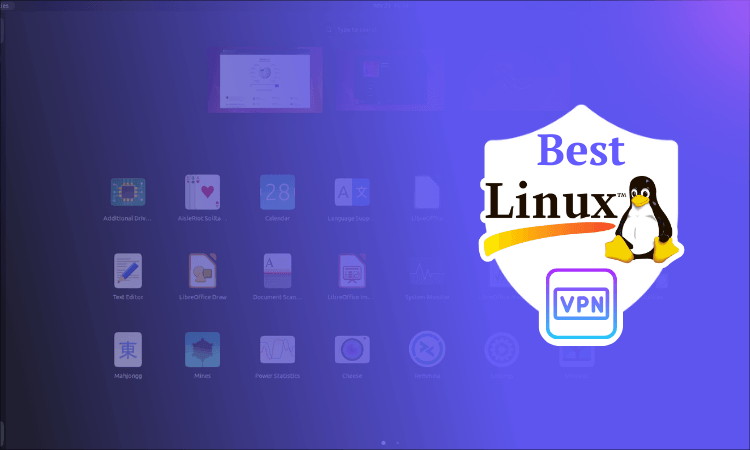
The Best VPN for Linux for 2025
- Table of Contents
- My Top Choice: Private Internet Access, the Best VPN for Linux
- How to Choose the Best Linux VPN Provider
- The 6 Best VPNs for Linux Compared
- 1. Private Internet Access -- Best VPN for Linux
- 2. Proton VPN -- Best Free VPN for Linux
- 3. ExpressVPN -- Best for Streaming on Linux Devices
- 4. NordVPN -- Reliable Security for Linux Devices
- 5. Surfshark -- Most Affordable VPN for Linux
- 6. Windscribe VPN - User-Friendly GUI App for Linux
- Can You Use a Free VPN for Linux?
- How to Install, Set Up & Use a VPN on Linux
- Why Should You Use a VPN With Linux?
- Conclusion
- FAQ: Linux VPN
Quick Answer: What Is the Best VPN for Linux?
- Private Internet Access — Best VPN for Linux
- Proton VPN — Best free VPN for Linux
- ExpressVPN — Best for streaming on Linux devices
- NordVPN — Reliable security for Linux devices
- Surfshark — Affordable VPN for Linux
- Windscribe — User-friendly GUI app for Linux
Though Linux may seem intimidating, thanks to its terminal interfaces, it’s a smooth system that can do everything other mainstream systems do. You can stream, play games or download whatever you want on a Linux device, but you need the best VPN for Linux to maximize all these operations. Our best VPN list tries to cover all devices, including Linux.
The biggest challenge for new Linux users is navigating the terminal when setting up a virtual private network. Fortunately, some Linux VPN apps have a user-friendly graphical user interface (GUI) that lets you choose servers, switch VPN protocols and enable important features like the kill switch.
In this article, I’ll take you through the six best Linux VPNs, exploring all the features that make them ideal for this operating system. We’ll look at the Linux versions each VPN is compatible with, the number of servers each offers, the protocols available and their pricing plans. If you’re looking for a free service, I recommend clicking over to our best free VPN list instead.
My Top Choice: Private Internet Access, the Best VPN for Linux
Private Internet Access (PIA) is my top Linux VPN recommendation because it’s one of the few options with a feature-for-feature GUI that matches its Windows and macOS counterparts. You don’t need to torture yourself with terminal command lines or extra tools like NetworkManager.
Furthermore, PIA works with multiple Linux distributions (or distros), like Ubuntu, Mint, Debian, Fedora and Arch. It packs amazing speeds for streaming, strong encryption (see our encryption guide for more context), IP leak protection and a large VPN server network to unblock Netflix just about anywhere.
How to Choose the Best Linux VPN Provider
I tested multiple VPN providers for my Linux PC to find the ones that work. Here are the factors I noticed when drawing up my final list of six.
- Linux support: Some VPNs are not compatible with certain Linux versions, which can limit the number of devices you can use. The ideal VPN for Linux must be compatible with commonly used distros like Ubuntu, Debian, Mint, Fedora and Arch.
- VPN speeds: Fast speeds are important for streaming and gaming on Linux devices. The VPN should be able to bypass potential speed throttling from an internet service provider.
- Security and privacy: The Linux system is safe, but that doesn’t make you immune to cyber threats. Your online traffic is still visible, but a good VPN offers encryption, which makes it hard for anyone besides you to see the websites you’re visiting.
- Streaming capabilities: The VPN should be able to access streaming platforms like Hulu, Peacock TV and Netflix from any device — you can check out our Canadian Netflix guide to get an idea of how this might work.
- Server network: A large server network covers more areas, which lets you unblock more content. Having more servers also reduces the chances of server congestion, which improves speeds.
- Pricing: The VPN must be affordable, with a money-back guarantee to cater to users on a tight budget.
As long as you combine them with good password security, these VPNs will keep you safe without breaking a sweat.
GUI App vs Command Line App for Linux
There are two ways to use applications on Linux-based systems. You can use a graphical user interface (GUI) to interact directly with the system through actionable elements like buttons, icons and windows. A command line interface (CLI), on the other hand, is text-based. You need to enter specific commands to perform tasks.
Though a GUI is preferable for ease of use, a CLI gives you greater control over the system, which is why it’s popular with nerds who have sold their souls to the /dev/null. Normal humans like you and me had better stick to a GUI.
The 6 Best VPNs for Linux Compared
| VPN: | Price | Linux GUI | Distros | Speed | No-Logs Policy | Security |
|---|---|---|---|---|---|---|
| PIA | $1.98 per month/three-year plan | ✔️ | Ubuntu Mint Debian Fedora Arch | Fast | ✔️ | AES-256 AES 128 |
| Proton VPN | $4.99 per month/two-year plan | ✔️ | Ubuntu Debian Fedora | Fast | ✔️ | AES-256 ChaCha20 |
| ExpressVPN | $6.67 per month/one-year plan | ❌ | Ubuntu Debian Fedora Raspberry Pi Mint Arch | Fastest | ✔️ | AES-256 ChaCha20 |
| NordVPN | $3.99 per month/two-year plan | ❌ | Ubuntu Debian Elementary OS Mint Fedora | Very fast | ✔️ | AES-256 ChaCha20 |
| Surfshark | $2.39 per month/two-year plan | ✔️ | Debian Ubuntu Mint | Very fast | ✔️ | AES-256 |
| Windscribe | $5.75 per month/one-year plan | ✔️ | Ubuntu Fedora Arch Debian CentOS | Fast | ✔️ | AES-256-GCM ChaCha20 |
1. Private Internet Access — Best VPN for Linux
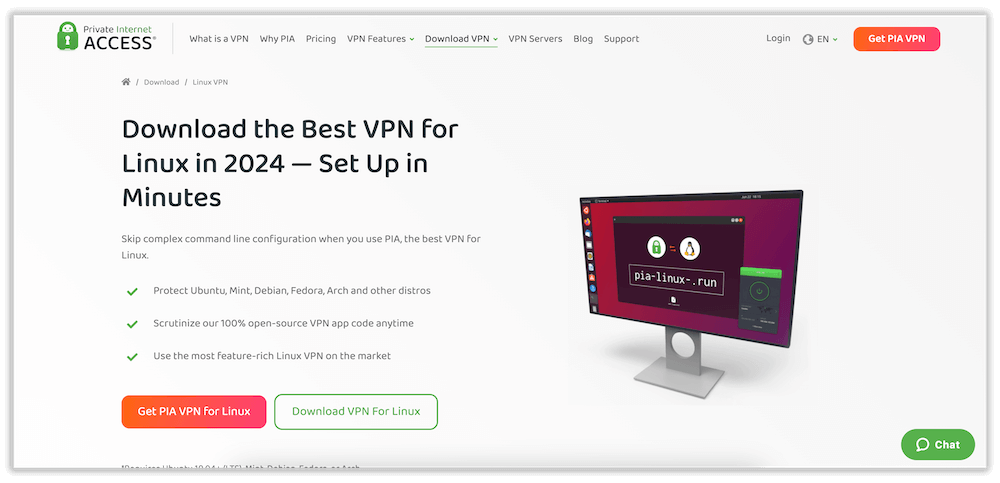
- Dedicated Linux app
- Port forwarding
- Large server network
- Doesn’t unblock some streaming sites
If you are a Linux user who is unfamiliar with the CLI, then Private Internet Access is suited for your needs. This VPN offers fast speeds with unlimited bandwidth, so you can download bulky files without worries about hitting data caps.
The P2P support on every server gives you faster torrenting speeds while keeping your privacy intact. PIA also offers port forwarding across all its Linux apps, which speeds up your torrents regardless of location. You can get more detailed information from our Private Internet Access review.
Why I Think Private Internet Access Is a Good Choice
- Linux support: You can run PIA on Ubuntu 18.04+ (LTS), Mint, Debian, Fedora, or Arch. The VPN requires 32- or 64-bit system architectures, such as systemd, sysvinit or openrc-based systems. You can connect unlimited devices on a single PIA account, which is ideal if you use multiple Linux devices.
- Server network: PIA has more than 30,000 servers in North and South America, Europe, Asia, Africa and the Middle East. Unblocking geo-restricted content went much more smoothly for me than with VPNs with smaller server networks. However, though it unblocked most streaming sites, I couldn’t access Amazon Prime Video with PIA.
| Region | Countries | Locations |
|---|---|---|
| North America | 6 | 53 |
| South America | 10 | 10 |
| Europe | 44 | 48 |
| Asia | 18 | 18 |
| Africa | 5 | 5 |
| Oceania | 2 | 6 |
| Middle East | 4 | 4 |
- Security and privacy: PIA’s impressive list of security and privacy features is partly why it tops this list. It has RAM-only servers that delete your session with each reboot, leaving no online trace that can be tied back to you.
A multi-hop obfuscation feature routes your internet connection through two servers while masking all traces of the VPN from your traffic, perfect for networks and regions that try to block VPN use.
| Protocol: | Encryption | Devices |
|---|---|---|
| OpenVPN | AES-128 AES-256 | Windows macOS Android iOS Linux |
| WireGuard | AES-128 AES-256 | Windows macOS Android iOS Linux |
Private Internet Access Pricing & Value
PIA offers three price options. The three-year plan is the best value for your money, costing $1.98 per month with an extra four free months. If that’s not your cup of tea, you can try the one-year plan for $3.33 per month or the shorter but costlier monthly plan for $11.95. A 30-day money-back guarantee covers all the plans, so try it out.
2. Proton VPN — Best Free VPN for Linux
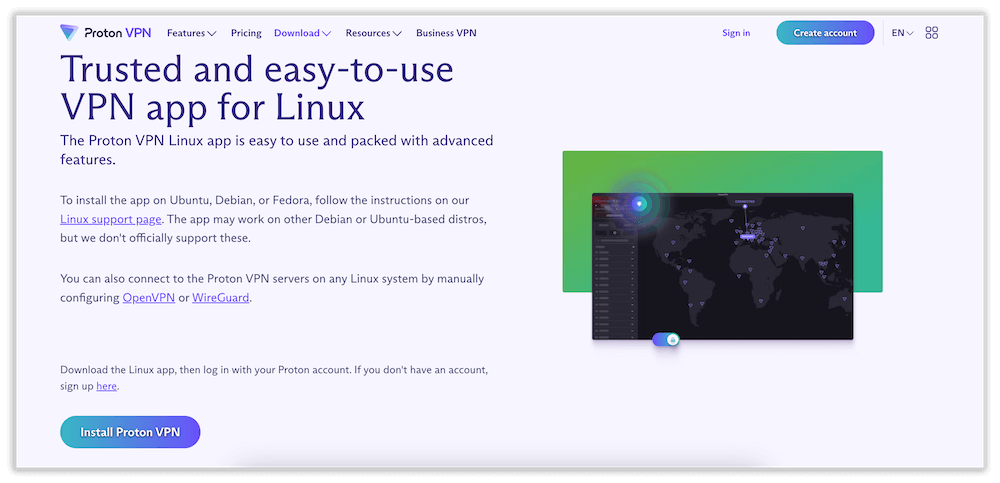
- Linux GUI app
- Free version
- Reliable Secure Core servers
- Free version offers only five locations
- Free server selection is random
Proton VPN is the best free VPN, with an intuitive GUI that makes it user-friendly for newbies on a budget. You can also switch to the CLI if you’re an advanced user.
The bottom line is that no matter which route you choose, Proton VPN works like a charm on major Linux distros. The speeds are impressive, and you can activate a special feature called the “VPN accelerator” to receive a major speed boost for activities like gaming, streaming or torrenting.
Why I Think Proton VPN Is a Good Choice
- Linux support: Proton VPN works on most of the latest and most stable Linux distros, like Debian, Ubuntu and Fedora. Plus, you can connect up to 10 simultaneous devices on the premium account. The free version limits you to one device at a time. We discuss these versions in our Proton VPN review.
- Server network: You gain access to more than 3,200 servers in 71 countries distributed across all continents to unblock geo-restricted content with ease. Most of these servers are located in Europe and come with specialty servers like Tor over VPN, which routes your internet traffic through the Tor network for extra anonymity.
| Region | Countries | Locations |
|---|---|---|
| North America | 5 | 20 |
| South America | 6 | 6 |
| Europe | 33 | 37 |
| Asia | 12 | 15 |
| Africa | 3 | 3 |
| Oceania | 2 | 5 |
| Middle East | 3 | 3 |
- Security and privacy: A unique security asset that caught my eye was the Secure Core servers. They pass your online traffic through privacy-friendly countries like Switzerland, Iceland or Sweden to counter network-based attacks.
Proton VPN owns and operates these VPN servers, so no third parties are involved. They also have strong physical security. There’s also the ever-reliable NetShield ad blocker, which I always use when dealing with websites crawling with annoying pop-up ads and trackers.
| Protocol | Encryption | Devices |
|---|---|---|
| WireGuard | ChaCha20 | Windows macOS Android iOS iPadOS |
| IKEv2 | AES-256-GCM | macOS |
| OpenVPN | AES-256-GCM | Windows Android |
| Stealth | AES-256-GCM | macOS Android iOS iPadOS |
| OpenVPN DCO | AES-256-GCM | Linux |
Proton VPN Pricing & Value
Proton VPN’s cheapest price plan is the 24-month option, which costs $4.99 per month. Next is the 12-month plan, which goes for $5.99 per month, and the monthly option, which costs $9.99. A risk-free 30-day money-back guarantee backs each plan. Alternatively, you can use the VPN for free and access five locations but with only automatic server selection and standard encryption.
3. ExpressVPN — Best for Streaming on Linux Devices
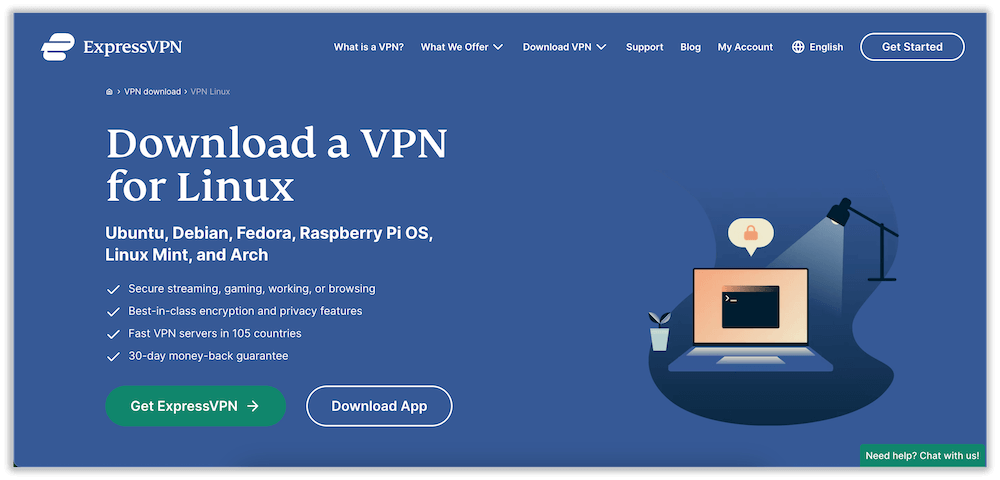
- Fast streaming speeds
- GUI via browser extensions
- Automatic Linux updates
- Main VPN app lacks a GUI
If you don’t enjoy typing commands into the terminal, look away, because ExpressVPN for Linux is all CLI. Don’t let that scare you; once you get the hang of executing the commands, it becomes easy. Additionally, the specific commands for each action are available on the ExpressVPN website; you only have to copy and paste each one when needed.
Additionally, ExpressVPN offers a GUI through its browser extensions for Chrome, Edge and Firefox. Its speeds are also among the best thanks to its extremely fast and unique protocol called Lightway UDP, which combines well with speed-optimized servers for gaming, streaming and torrenting — more on that in our ExpressVPN review.
Why I Think ExpressVPN Is a Good Choice
- Linux support: ExpressVPN is compatible with Ubuntu, Fedora, Debian, Linux Mint, Arch and Raspberry Pi OS\ (32-bit only). You can also use the VPN directly on Steam Deck, which runs on Arch Linux, to play games and smoothly stream multiple platforms, like Netflix.
- ExpressVPN for Linux automatically updates, ensuring you get all the latest features without having to jump through manual installation hurdles every single time.
- Server network: ExpressVPN has more than 3,000 servers in 105 countries, all of which are RAM-only with P2P support. You can unblock streaming platforms like Peacock TV outside the U.S. with one command line to encrypt your VPN connection. ExpressVPN’s obfuscation can bypass VPN blocks on restricted networks or in censored regions like Russia.
| Region | Countries | Locations |
|---|---|---|
| North America | 14 | 40 |
| South America | 10 | 10 |
| Europe | 47 | 65 |
| Asia | 24 | 34 |
| Africa | 6 | 6 |
| Oceania | 2 | 9 |
| Middle East | 2 | 2 |
- Security and privacy: ExpressVPN for Linux protects your traffic with reliable AES-256 encryption. There’s a “threat manager” feature for countering pop-up ads and trackers on torrenting and gambling sites.
Additionally, the innovative TrustedServer technology ensures your data is wiped with every reboot to avoid data retrieval in the future. Automatic obfuscation on every server helps break through high-level VPN censorship in schools, workplaces and certain countries.
| Protocol | Encryption | Devices |
|---|---|---|
| Lightway | AES-256 ChaCha20 | Windows macOS iOS Android Linux routers |
| OpenVPN | AES-256 | Windows macOS Linux Android |
| IKEv2 | AES-256 | macOS iOS |
ExpressVPN Pricing & Value
ExpressVPN isn’t cheap, but a combination of discounts and a 30-day money-back guarantee can soften that blow. The VPN has three price plans, with the 12-month option offering the best deal at $6.67 per month with an extra three free months.
The six-month option goes for $9.99 per month, and the monthly option goes for $12.95. Our ExpressVPN price guide dives into more detail.
4. NordVPN — Reliable Security for Linux Devices
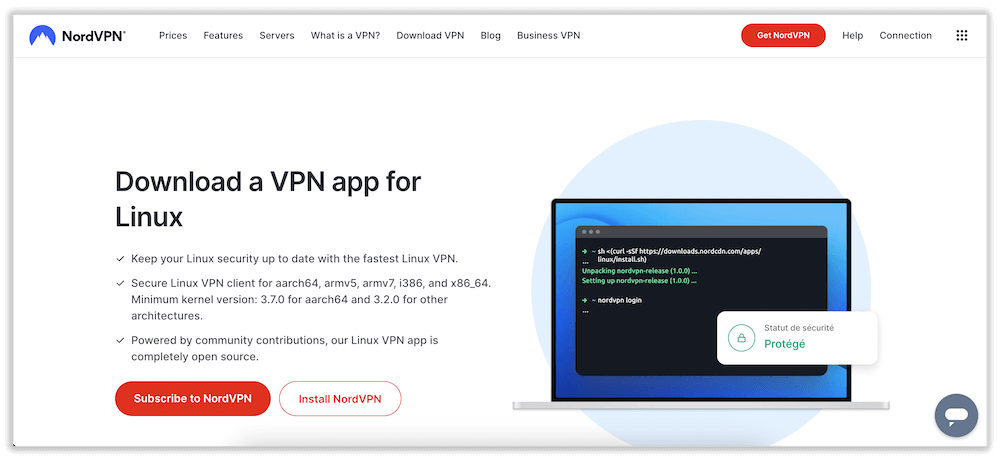
- Wide range of security & privacy features
- Meshnet for securely connecting Linux devices
- Offers P2P servers for torrenting
- No Linux GUI
- Double VPN can be slow
NordVPN is one of the most secure VPNs, as discussed in our NordVPN review. However, it doesn’t have a GUI for Linux, so you must enter command lines to get things moving.
Fortunately, NordVPN provides all the specific commands you need to download it, log in, select a server and much more. Open the command list, copy the one you need and paste it into the terminal. NordVPN’s speeds were impressive during my tests, enough to handle all my streaming and gaming needs without buffering.
Why I Think NordVPN Is a Good Choice
- Linux support: NordVPN provides installation packages for Ubuntu, Debian, Elementary OS, Linux Mint, Fedora, RHEL, Qubes OS, CentOS, openSUSE and many more. You can also connect a maximum of six devices simultaneously, which may not be as much as with PIA but is still helpful if you want to protect more than one device.
- Server network: NordVPN has more than 6,000 servers in 61 countries, most of which are in Europe. Unblocking content like BBC iPlayer or Qobuz was easy for me. It also has many servers in the United States but only one location in Africa, which I feel can be improved.
There are specialty P2P servers for torrenting, double VPN servers for twice the encryption and obfuscated servers for bypassing VPN blocks on restricted networks.
| Region | Countries | Locations |
|---|---|---|
| North America | 4 | 21 |
| South America | 4 | 4 |
| Europe | 37 | 43 |
| Asia | 9 | 10 |
| Africa | 1 | 1 |
| Oceania | 2 | 6 |
| Middle East | 3 | 3 |
- Security and privacy: NordVPN brings a bazooka to a fistfight, using one of the most reliable security frameworks in the game to keep your Linux devices safe. Besides the standard encryption that hides your IP address, you get Meshnet to pair your devices remotely and even share huge files.
The monitor scans the dark web for any traces of your credentials so you can change them to keep them away from hackers. The “threat protection” feature stops pop-up ads and trackers from interrupting your streaming or gaming.
| Protocol | Encryption | Devices |
|---|---|---|
| NordLynx | ChaCha20 | Windows macOS iOS Android Linux |
| OpenVPN | AES-256 | Windows macOS iOS Android Linux |
| IKEv2 | AES-256 | Windows Android |
NordVPN Pricing & Value
NordVPN Essential is the cheapest price option, with three plans. You get the best deal with the two-year plan, which will cost you $3.99 per month. The next best deal is the shorter one-year subscription, which costs $4.99 per month, and then the monthly plan for $12.99. A 30-day money-back guarantee covers all the plans.
5. Surfshark — Most Affordable VPN for Linux
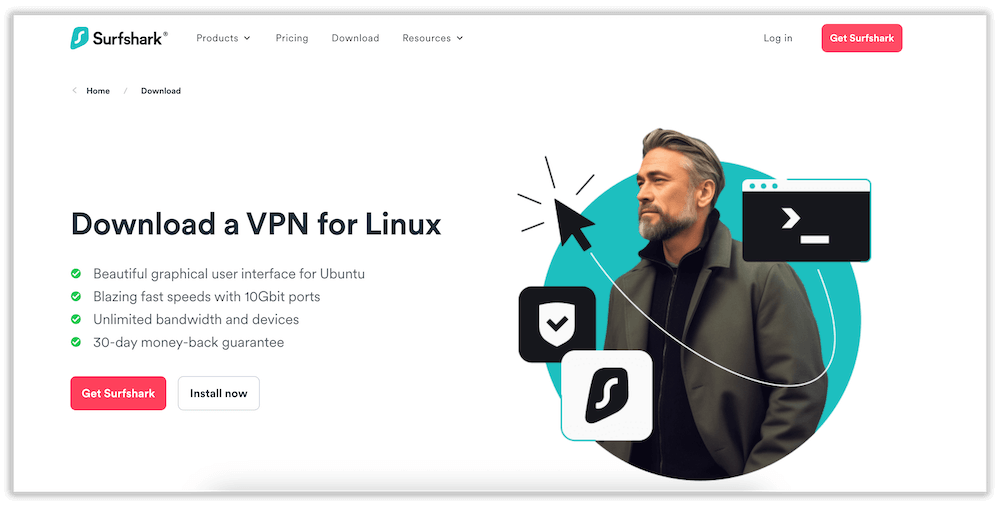
- Affordable price plans
- User-friendly GUI app
- Servers optimized for speeds
- Only works with Ubuntu, Debian & Mint
Surfshark uses command lines in the initial installation process, but you can access all the important app features like server lists, the kill switch and protocols through a user-friendly GUI app. You can connect to the server of your choice, favorite the ones you use the most and manage all other features, like the VPN kill switch, CleanWeb and many more.
Something else I love about Surfshark for Linux is that updates are automatic, so you don’t have to go back to the terminal to update it. However, you also have the option to manually update.
The speeds were impressive, thanks partly to the fast 10Gbit ports through which Surfshark routes your traffic. There are no bandwidth caps either, so you are free to handle heavy torrent files or stream in 4K without worrying about running out of steam.
Why I Think Surfshark Is a Good Choice
- Linux support: Surfshark works with Debian 11 and higher, Ubuntu 20.04 and higher, and Mint 20 and higher. Some system requirements for smooth operations include desktops that support GNOME, XFCE or KDE; amd64 architecture; and compatibility with the systemd service manager.
Furthermore, you can connect unlimited devices, making it ideal for those on a tight budget. Our Surfshark review expands on the benefits of these unlimited simultaneous connections.
- Server network: Surfshark offers more than 3,200 RAM-only servers in 100 countries. Server congestion isn’t a problem because each Surfshark server uses fast ports that transmit data as fast as possible. The server distribution is also very balanced compared to some alternatives, making it easier to unblock sites on any Linux device.
| Region | Countries | Locations |
|---|---|---|
| North America | 8 | 34 |
| South America | 10 | 10 |
| Europe | 45 | 62 |
| Asia | 25 | 26 |
| Africa | 6 | 6 |
| Oceania | 2 | 6 |
| Middle East | 3 | 3 |
- Security and privacy: Surfshark has a no-logs policy, so it never saves your activity logs. You also get a kill switch, IP and DNS leak protection, and an ad blocker called CleanWeb, which prevents pesky pop-up ads from interrupting your sessions and stops trackers that try to spy on you when you open certain websites.
| Protocol | Encryption | Devices |
|---|---|---|
| WireGuard | AES-256-GCM ChaCha20 | Windows macOS iOS Android |
| OpenVPN | AES-256-GCM | Windows macOS iOS Android Linux |
| IKEv2 | AES-256-GCM | macOS iOS Android |
Surfshark Pricing & Value
Surfshark is one of the most affordable VPNs around, and the cheapest option is Surfshark Starter. The 24-month plan offers the best value at $2.39 per month with an extra free month. Next is the 12-month option, which costs $3.99 per month, and finally, you can try the monthly plan for $10.99. All the plans offer a 30-day money-back guarantee.
6. Windscribe VPN – User-Friendly GUI App for Linux
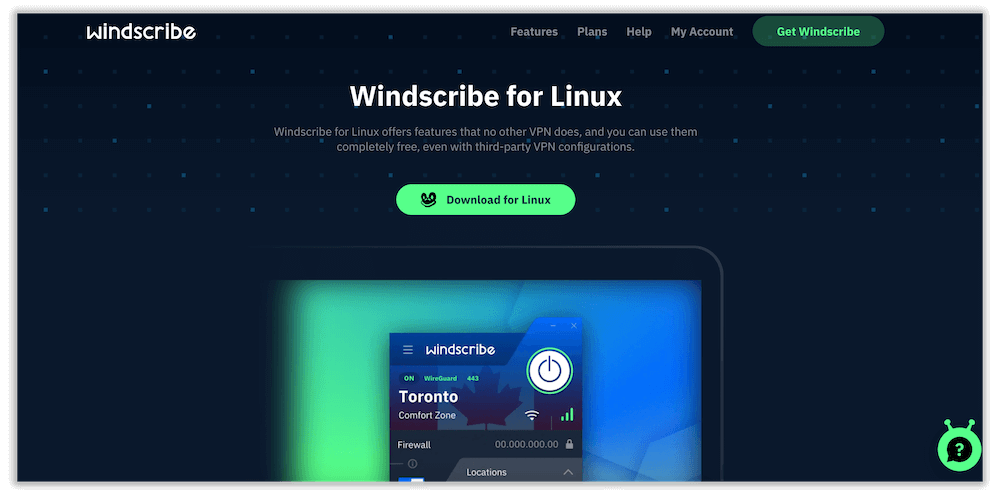
- Unlimited simultaneous connections
- Linux GUI app
- Free version
- Free version has a monthly 10GB data cap
- GUI has been buggy in the past
Windscribe, like PIA, has a user-friendly graphical user interface similar to what you get with Windows, macOS, Android or iOS. Reddit users have complained about the GUI app’s instability, but some recent updates have significantly improved the issue. In the meantime, you can use the CLI command to get Windscribe working on your Linux device.
Why I Think Windscribe Is a Good Choice
- Linux support: You can use Windscribe on Ubuntu, Fedora, Debian, Arch or CentOS. Differing from PIA and Surfshark, both the free and paid plans give you unlimited simultaneous connections, plus 10GB of free data and servers in 11 countries. That said, I still think it’s worth it to pay to have unlimited data.
- Server network: Windscribe covers 110 locations in 69 countries. Its client connects you to the best available server in whichever location you choose. I’ve never had trouble unblocking major streaming sites like Netflix or Peacock TV, but the limited locations in Africa and the Middle East may be a challenge if you want to view content from there.
| Region | Countries | Locations |
|---|---|---|
| North America | 4 | 33 |
| South America | 6 | 6 |
| Europe | 38 | 46 |
| Asia | 13 | 13 |
| Africa | 3 | 3 |
| Oceania | 2 | 6 |
| Middle East | 2 | 2 |
| Antarctica | 1 | 1 |
- Security and privacy: Windscribe offers obfuscation via the Stealth protocol, plus MAC address spoofing for Linux devices, which prevents public WiFi operators from keeping records of your MAC address by changing it every time you connect. There’s also a kill switch called “firewall” that prevents leaks if your VPN connection drops.
| Protocol | Encryption | Devices |
|---|---|---|
| WireGuard | AES-256-GCM ChaCha20 | Windows macOS iOS Android Linux |
| OpenVPN | AES-256-GCM 4096-bit RSA | Windows macOS iOS Android Linux |
| IKEv2 | AES-256-GCM | Windows macOS iOS Android Linux |
| Stealth | SSL | Windows macOS iOS Android Linux |
Windscribe Pricing & Value
Windscribe VPN offers a free version that we discuss in detail in our Windscribe VPN review. The premium version has two main price plans. The yearly plan costs $5.75 per month, and the monthly plan costs $9 every 30 days. However, this VPN has the shortest refund period; you only get three days and can only receive a refund if you have used less than 10GB of data.
Can You Use a Free VPN for Linux?
You can use a free VPN for Linux, but there are many reasons why I don’t recommend it. First, many free VPNs aren’t safe, and you can’t always determine which ones will betray you. One of their revenue generation tactics is selling your private data to third parties, and there’s no telling what might happen to you if that data falls into the wrong hands.
Secondly, most free VPNs have limited servers and lack vital security features like obfuscation, so the chances of being exposed are much higher than with premium options. Finally, you won’t enjoy fast speeds due to server congestion and the inability to properly bypass ISP speed throttling.
The Best Free Linux VPN Service: Proton VPN
The best free Linux VPN service is Proton VPN. It offers free servers in the United States, the Netherlands, Japan, Poland and Romania, randomly connecting you for extra security. Proton VPN also offers reliable encryption to protect you on any network, plus no monthly data limits.
How to Install, Set Up & Use a VPN on Linux
Setting up a VPN on Linux may seem intimidating, but anyone can quickly hack it in a matter of minutes. The process is easier for VPNs like Private Internet Access, which comes with a GUI that’s easier to navigate. Let’s break down the two processes with detailed step-by-step guides.
How to Set Up & Use a VPN With a GUI App on Linux
If you’re using a VPN like PIA, which comes with a GUI app, here’s how to set it up on your Linux device.
- Subscribe to Private Internet Access
- Choose a pricing plan that fits your budget. You can do this directly on the official PIA website and check out with your preferred payment option.
- Download the Linux app installer
- It needs to be compatible with the Linux version you’re using. PIA is compatible withUbuntu 18.04+, Mint, Debian, Arch and Fedora.
- Run the installer
- Locate the installer in your download folder and run it. Wait for the installation to complete.
- Start using PIA
- You’re ready to use PIA for Linux through the user-friendly GUI. You can change protocols, activate the kill switch and ad blockers, and connect to the server of your choice.
How to Set Up & Use a VPN on Linux Using the Terminal
The setup process for VPNs that use a CLI to install and run on Linux devices varies. NordVPN has the most straightforward setup.
1. Install the app
First, install NordVPN by typing the command line below in the terminal.
- sh <(curl -sSf https://downloads.nordcdn.com/apps/linux/install.sh)
2. Log in to your account
If you are still in the terminal, type in the following command to log in to your NordVPN account.
- nordvpn login
3. Connect to a server
To connect to a server, type the following command in the terminal.
- nordvpn connect
4. Adjust your settings
With the VPN now running, you can adjust your settings based on what you want the VPN to do. Here’s a link showing all the important commands to activate the kill switch, threat protection or obfuscated servers; select NordLynx; and more.
Why Should You Use a VPN With Linux?
One of the most pervasive VPN myths is that Linux users don’t need one. You need to use a VPN with Linux to stop your internet service provider or anyone else from intercepting and seeing your online traffic. A VPN also protects you in heavily censored regions like Russia, where the government spies on its citizens through state-controlled ISPs.
A VPN also helps you access geo-restricted content by switching your IP address to any part of the world with a single click. This is how you can unblock streaming sites like Peacock TV or Sling TV outside the United States. It also foils geolocation tracking, which is absolutely a risk even if you run Linux.
Which Linux Distro Is Best for Online Privacy?
Qubes OS, a Fedora-based Linux distro, is the best for online privacy because it isolates different components of the Linux system, making it easy to quickly separate compromised parts without affecting the rest.
Conclusion
Linux is not for the faint-hearted, but there are workarounds for the challenging installation process that let you use VPNs without issues. Private Internet Access is still my top recommendation for Linux because it has the easiest GUI app and offers the largest server network for unblocking any content you want.
Other alternatives you can consider include Proton VPN (which offers a free version), ExpressVPN (reliable and fast speeds), NordVPN (best security features), and Surfshark (affordable price plans).
If you have used a VPN with Linux before, how was the experience compared to with other operating systems like Windows or macOS? Did the VPN work right away, or did you have to resort to advanced troubleshooting using command lines? Tell us about your experience in the comments below, and as always, thank you for reading our content.
FAQ: Linux VPN
Do VPNs Work With Linux?
VPNs work with Linux. You can install and manage them through the terminal using command lines or a GUI app that functions similarly to Windows and macOS.What Is the Best VPN to Use in Linux?
Private Internet Access is the best VPN to use with Linux because it comes with a GUI app that’s easy to navigate, even for first-time users. PIA also has a large server network that lets you unblock restricted content in most parts of the world.Are There Free VPNs for Linux?
There are free VPNs for Linux. However, they may be unsafe since free VPNs don’t secure user data. Proton VPN is the best free VPN for Linux, as it is secure and offers free servers in five locations.Does Linux Come With a VPN Preinstalled?
Linux doesn’t come with a VPN preinstalled. If you want to enjoy the benefits of a VPN service, subscribe to one and install it on your Linux device.

Leave a Reply